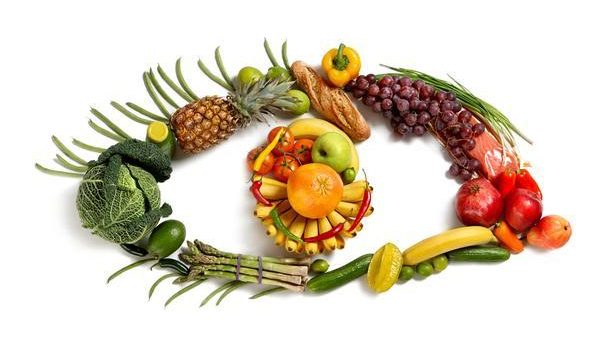
Introduction
In a world where screens dominate our lives and digital devices are our constant companions, taking care of our eyes has never been more critical. Yet, amidst the hustle and bustle of daily life, we often overlook the importance of nutrition in maintaining healthy vision. The saying “you are what you eat” holds true when it comes to your eyes. To shed light on this often neglected aspect of eye care, we turn to Dr. Whitney Seltman, an optometrist with years of experience and a passion for preserving eye health. In this comprehensive guide, we’ll explore the top 10 foods that are good for your eyes, backed by scientific research and Dr. Seltman’s expert insights.
Meet Dr. Whitney Seltman, OD
Dr. Whitney Seltman is a respected optometrist who has dedicated her career to advancing eye care. With a focus on whole foods and natural remedies for health, she brings a unique perspective to the world of eye care. Dr. Seltman’s commitment to staying at the forefront of optometry and her passion for preserving eye health make her the perfect knowledge source for this article. Her insights and expertise have been medically reviewed to ensure the accuracy and reliability of the information presented here.

The Importance of Eye Health
Our eyes are remarkable organs, allowing us to perceive the world around us with precision and clarity. However, maintaining good eye health is not guaranteed. Factors such as age, genetics, and environmental influences can impact our vision. One aspect of eye health that we can control is our diet. The foods we consume play a significant role in supporting and protecting our eyes.
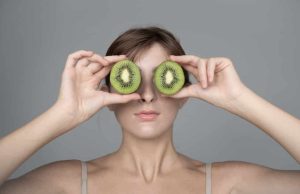
The Top 10 Foods for Healthy Eyes
Let’s delve into the world of eye-boosting nutrition and explore the 10 foods that can make a difference in your eye health. We’ll not only discuss the benefits of each food but also provide practical tips on how to incorporate them into your daily diet.
1. Raw Red Peppers
Key Nutrient: Vitamin C
Benefits:
- Promotes healthy blood vessels in the eyes.
- May lower the risk of cataracts.
- Also found in bok choy, cauliflower, papayas, and strawberries.
- Consume raw for maximum vitamin C benefits.
Raw red peppers, bursting with vitamin C, offer a powerful boost to the blood vessels in your eyes. Learn how this antioxidant-rich vegetable can potentially lower your risk of cataracts. Discover other vitamin C sources like bok choy, cauliflower, papayas, and strawberries, and find out why going raw is the way to go.

2. Sunflower Seeds and Nuts
Key Nutrient: Vitamin E
Benefits:
- Supports age-related macular degeneration (AMD) prevention.
- May help prevent cataracts.
- Almonds and sunflower seeds provide a rich source of vitamin E.
- Consider hazelnuts, peanuts, and peanut butter as alternatives.
Did you know that a mere ounce of sunflower seeds or almonds can provide half your daily recommended vitamin E intake? Dive into a large study’s findings on how vitamin E, when combined with other nutrients, can slow the progression of age-related macular degeneration (AMD) and possibly prevent cataracts. Explore alternative sources like hazelnuts, peanuts, and peanut butter.
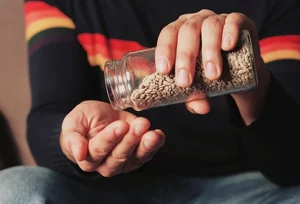
3. Dark, Leafy Greens
Key Nutrients: Vitamins C and E, Lutein, and Zeaxanthin
Benefits:
- Reduces the risk of long-term eye diseases, including AMD and cataracts.
- Kale, spinach, and collard greens are excellent sources.
- Western diets often lack these crucial nutrients.
Kale, spinach, and collard greens, rich in vitamins C and E, as well as lutein and zeaxanthin, are superheroes for your eyes. Uncover how these plant-based nutrients lower your risk of long-term eye diseases, including AMD and cataracts, and why they’re often lacking in Western diets.
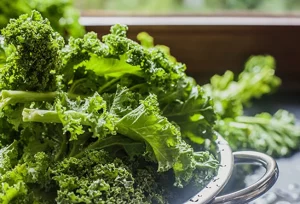
4. Salmon
Key Nutrients: Omega-3 Fatty Acids (DHA and EPA)
Benefits:
- Essential for retinal health.
- Protects against AMD and glaucoma.
- Low levels of omega-3s linked to dry eyes.
- Also found in tuna and trout.
Your retinas crave two omega-3 fatty acids: DHA and EPA. Discover why fatty fish like salmon, tuna, and trout are essential for maintaining healthy eyes. Learn how omega-3s can shield your eyes from AMD and glaucoma and why maintaining adequate levels is crucial for preventing dry eyes.

5. Sweet Potatoes
Key Nutrient: Beta-Carotene (Vitamin A)
Benefits:
- Enhances night vision.
- Aids in adjusting to darkness.
- High in vitamin C and vitamin E.
- Other sources include carrots, cantaloupe, mangos, and apricots.
Orange-colored fruits and veggies, such as sweet potatoes, pack beta-carotene, a form of vitamin A that enhances night vision. Delve into how this nutrient helps your eyes adjust to darkness and explore other benefits like vitamin C and E found in a single sweet potato.

6. Lean Meat and Poultry
Key Nutrient: Zinc
Benefits:
- Facilitates the transport of vitamin A to the retina.
- Essential for melanin production, protecting the eyes.
- Oysters provide the highest zinc content.
- Beef, pork, and chicken (dark and breast meat) are also good sources.
Zinc plays a vital role in transporting vitamin A to your retinas for the production of protective melanin. While oysters top the zinc charts, learn how beef, pork, and chicken (both dark and breast meat) can also supply your body with this essential nutrient.

7. Beans and Legumes
Key Nutrient: Zinc
Benefits:
- Vegetarian, low-fat, high-fiber options for eye health.
- Chickpeas, black-eyed peas, kidney beans, and lentils are rich in zinc.
- Baked beans are a convenient choice.
Prefer a vegetarian approach to eye health? Chickpeas, black-eyed peas, kidney beans, and lentils are high in zinc, too. Discover how these legumes can keep your nighttime vision sharp and slow down AMD. A can of baked beans can do the trick, too!
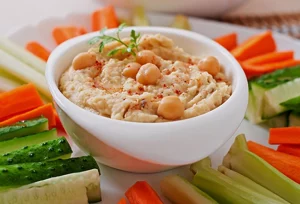
8. Eggs
Key Nutrients: Zinc, Lutein, and Zeaxanthin
Benefits:
- Zinc helps utilize lutein and zeaxanthin.
- Blocks harmful blue light from damaging the retina.
- Boosts protective pigment in the macula, vital for central vision.
Eggs bring you a package deal by combining zinc with lutein and zeaxanthin from their yolks. Learn how these compounds protect your retina from harmful blue light and boost the protective pigment in your macula, crucial for central vision.

9. Squash
Key Nutrients: Lutein, Zeaxanthin, Vitamins A, C, and Omega-3 Fatty Acids
Benefits:
- Year-round source of essential eye nutrients.
- Summer squash and winter squash offer unique benefits.
- Enhances overall eye health.
Your body can’t produce lutein and zeaxanthin, but squash provides them all year long. Explore the benefits of summer and winter squash, including vitamins A, C, and omega-3 fatty acids, which contribute to your eye health.
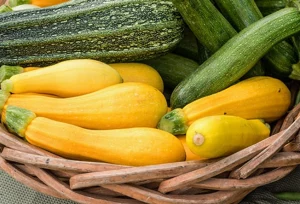
10. Broccoli and Brussels Sprouts
Key Nutrients: Vitamins A (as lutein, zeaxanthin, and beta-carotene), C, and E
Benefits:
- Antioxidants protect eye cells from free radicals.
- Safeguards retinas from oxidative damage.
- Crucial for maintaining healthy eye tissue.
These veggies offer a powerhouse of nutrients, including vitamin A, C, and E, that act as antioxidants, safeguarding your eyes from free radicals. Dive into how these compounds protect your retinas, which are particularly susceptible to oxidative damage.
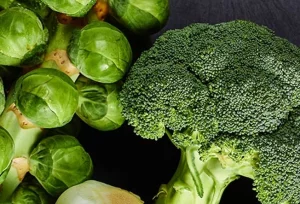
Comparative Table: Eye-Boosting Foods at a Glance
| Food | Key Nutrients | Benefits |
|---|---|---|
| Raw Red Peppers | Vitamin C | – Supports blood vessel health |
| – May reduce cataract risk | ||
| Sunflower Seeds | Vitamin E | – Aids in AMD prevention |
| and Nuts | – May prevent cataracts | |
| Dark, Leafy Greens | Vitamins C and E, | – Reduces risk of eye diseases |
| Lutein, Zeaxanthin | like AMD and cataracts | |
| Salmon | Omega-3 Fatty Acids | – Vital for retinal health |
| (DHA and EPA) | – Protects against AMD and glaucoma | |
| Sweet Potatoes | Beta-Carotene (Vitamin A) | – Enhances night vision |
| Lean Meat and | Zinc | – Facilitates vitamin A transport |
| Poultry | – Supports melanin production | |
| Beans and Legumes | Zinc | – Vegetarian option for eye health |
| Eggs | Zinc, Lutein, Zeaxanthin | – Blocks harmful blue light |
| – Boosts macular protective pigment | ||
| Squash | Lutein, Zeaxanthin, | – Year-round eye nutrient source |
| Vitamins A, C, Omega-3s | – Enhances overall eye health | |
| Broccoli and | Vitamins A, C, E | – Protects eye cells from free |
| Brussels Sprouts | radicals |








